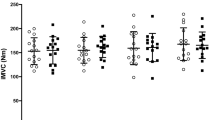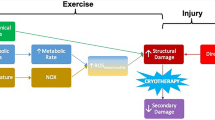Abstract
Historically, heat has been used in various clinical and sports rehabilitation settings to treat soft tissue injuries. More recently, interest has emerged in using heat to pre-condition muscle against injury. The aim of this narrative review was to collate information on different types of heat therapy, explain the physiological rationale for heat therapy, and to summarise and evaluate the effects of heat therapy before, during and after muscle injury, immobilisation and strength training. Studies on skeletal muscle cells demonstrate that heat attenuates cellular damage and protein degradation (following in vitro challenges/insults to the cells). Heat also increases the expression of heat shock proteins (HSPs) and upregulates the expression of genes involved in muscle growth and differentiation. In rats, applying heat before and after muscle injury or immobilisation typically reduces cellular damage and muscle atrophy, and promotes more rapid muscle growth/regeneration. In humans, some research has demonstrated benefits of microwave diathermy (and, to a lesser extent, hot water immersion) before exercise for restricting muscle soreness and restoring muscle function after exercise. By contrast, the benefits of applying heat to muscle after exercise are more variable. Animal studies reveal that applying heat during limb immobilisation attenuates muscle atrophy and oxidative stress. Heating muscle may also enhance the benefits of strength training for improving muscle mass in humans. Further research is needed to identify the most effective forms of heat therapy and to investigate the benefits of heat therapy for restricting muscle wasting in the elderly and those individuals recovering from serious injury or illness.



Similar content being viewed by others
References
Hausswirth C, Mujika I. Introduction. In: Hausswirth C, Mujika I (eds). Recovery for performance in sport. Champaign: Human Kinetics; 2013. pp. viii–xiii.
Goto K, Oda H, Kondo H, et al. Responses of muscle mass, strength and gene transcripts to long-term heat stress in healthy human subjects. Eur J Appl Physiol. 2011;111(1):17–27.
Morimoto Y, Kondo Y, Kataoka H, et al. Heat treatment inhibits skeletal muscle atrophy of glucocorticoid-induced myopathy in rats. Physiol Res. 2015;64(6):897–905.
Touchberry CD, Gupte AA, Bomhoff GL, et al. Acute heat stress prior to downhill running may enhance skeletal muscle remodeling. Cell Stress Chaperones. 2012;17(6):693–705.
Takeuchi K, Hatade T, Wakamiya S, et al. Heat stress promotes skeletal muscle regeneration after crush injury in rats. Acta Histochem. 2014;116(2):327–34.
Selsby JT, Dodd SL. Heat treatment reduces oxidative stress and protects muscle mass during immobilization. Am J Physiol Regul Integr Comp Physiol. 2005;289(1):R134–9.
Frier BC, Locke M. Heat stress inhibits skeletal muscle hypertrophy. Cell Stress Chaperones. 2007;12(2):132–41.
Vaile J, Halson S, Gill N, et al. Effect of hydrotherapy on the signs and symptoms of delayed onset muscle soreness. Eur J Appl Physiol. 2008;102(4):447–55.
Vaile J, Halson S, Gill N, et al. Effect of hydrotherapy on recovery from fatigue. Int J Sports Med. 2008;29(7):539–44.
Goto K, Oda H, Morioka S, et al. Skeletal muscle hypertrophy induced by low-intensity exercise with heat-stress in healthy human subjects. Jpn J Aerosp Environ Med. 2007;44(1):13–8.
Nosaka K, Muthalib M, Lavender A, et al. Attenuation of muscle damage by preconditioning with muscle hyperthermia 1-day prior to eccentric exercise. Eur J Appl Physiol. 2007;99(2):183–92.
Iguchi M, Shields RK. Prior heat stress effects fatigue recovery of the elbow flexor muscles. Muscle Nerve. 2011;44(1):115–25.
Skurvydas A, Kamandulis S, Stanislovaitis A, et al. Leg immersion in warm water, stretch-shortening exercise, and exercise-induced muscle damage. J Athl Train. 2008;43(6):592–9.
Versey NG, Halson SL, Dawson BT. Water immersion recovery for athletes: Effect on exercise performance and practical recommendations. Sports Med. 2013;43(11):1101–30.
Symons BT, Clasey JL, Gater DR, et al. Effects of deep heat as a preventative mechanism on delayed onset muscle soreness. J Strength Cond Res. 2004;18(1):155–61.
Saga N, Katamoto S, Naito H. Effect of heat preconditioning by microwave hyperthermia on human skeletal muscle after eccentric exercise. J Sports Sci Med. 2008;7:176–83.
Nosaka K, Sakamoto K, Newton M, et al. Influence of pre-exercise muscle temperature on responses to eccentric exercise. J Athl Train. 2004;39(2):132–7.
Bailey SJ, Wilkerson DP, Fulford J, et al. Influence of passive lower-body heating on muscle metabolic perturbation and high-intensity exercise tolerance in humans. Eur J Appl Physiol. 2012;112(10):3569–76.
Garramone RR Jr, Winters RM, Das DK, et al. Reduction of skeletal muscle injury through stress conditioning using the heat-shock response. Plast Reconstr Surg. 1994;93(6):1242–7.
Naito H, Powers SK, Demirel HA, et al. Heat stress attenuates skeletal muscle atrophy in hindlimb-unweighted rats. J Appl Physiol (1985). 2000;88(1):359–363.
Kojima A, Goto K, Morioka S, et al. Heat stress facilitates the regeneration of injured skeletal muscle in rats. J Orthop Sci. 2007;12(1):74–82.
Khamwong P, Nosaka K, Pirunsan U, et al. Prophylactic effect of hot pack on symptoms of eccentric exercise-induced muscle damage of the wrist extensors. Eur J Sport Sci. 2012;12(5):443–53.
Khamwong P, Paungmali A, Pirunsan U, et al. Prophylactic effects of sauna on delayed-onset muscle soreness of the wrist extensors. Asian J Sports Med. 2015;6(2):e25549.
Vardiman JP, Moodie N, Siedlik JA, et al. Short-wave diathermy pretreatment and inflammatory myokine response after high-intensity eccentric exercise. J Athl Train. 2015;50(6):612–20.
Evans RK, Knight KL, Draper DO, et al. Effects of warm-up before eccentric exercise on indirect markers of muscle damage. Med Sci Sports Exerc. 2002;34(12):1892–9.
Castellani JW, Zambraski EJ, Sawka MN, et al. Does high muscle temperature accentuate skeletal muscle injury from eccentric exercise? Physiol Rep. 2016;4(9):e12777.
Shibaguchi T, Sugiura T, Fujitsu T, et al. Effects of icing or heat stress on the induction of fibrosis and/or regeneration of injured rat soleus muscle. J Physiol Sci. 2016;66(4):345–57.
Selsby JT, Rother S, Tsuda S, et al. Intermittent hyperthermia enhances skeletal muscle regrowth and attenuates oxidative damage following reloading. J Appl Physiol. 2007;102(4):1702–7.
Clarke DH. Effects of immersion in hot and cold water upon recovery of muscular strength following fatiguing isometric exercise. Arch Phys Med Rehabil. 1963;44:565–8.
Mayer JM, Mooney V, Matheson LN, et al. Continuous low-level heat wrap therapy for the prevention and early phase treatment of delayed-onset muscle soreness of the low back: a randomized controlled trial. Arch Phys Med Rehabil. 2006;87(10):1310–7.
Viitasalo JT, Niemela K, Kaappola R, et al. Warm underwater water-jet massage improves recovery from intense physical exercise. Eur J Appl Physiol Occup Physiol. 1995;71(5):431–8.
Kuligowski LA, Lephart SM, Giannantonio FP, et al. Effect of whirlpool therapy on the signs and symptoms of delayed onset muscle soreness. J Athl Train. 1998;33(3):222–8.
Jayaraman RC, Reid RW, Foley JM, et al. MRI evaluation of topical heat and static stretching as therapeutic modalities for the treatment of eccentric exercise-induced muscle damage. Eur J Appl Physiol. 2004;93(1–2):30–8.
Pournot H, Bieuzen F, Duffield R, et al. Short term effects of various water immersions on recovery from exhaustive intermittent exercise. Eur J Appl Physiol. 2011;111(7):1287–95.
Stadnyk AMJ, Rehrer NJ, Handcock PJ, et al. No clear benefit of muscle heating on hypertrophy and strength with resistance training. Temperature (Epub 7 Dec 2017).
Noble EG, Milne KJ, Melling CW. Heat shock proteins and exercise: a primer. Appl Physiol Nutr Metab. 2008;33(5):1050–65.
Morton JP, Kayani AC, McArdle A, et al. The exercise-induced stress response of skeletal muscle, with specific emphasis on humans. Sports Med. 2009;39(8):643–62.
Brinkmeier H, Ohlendieck K. Chaperoning heat shock proteins: proteomic analysis and relevance for normal and dystrophin-deficient muscle. Proteom Clin Appl. 2014;8(11–12):875–95.
Archer AE, Von Schulze AT, Geiger PC. Exercise, heat shock proteins and insulin resistance. Philos Trans R Soc Lond B Biol Sci. 2018;373(1738):20160529.
Thakur SS, Swiderski K, Ryall JG, et al. Therapeutic potential of heat shock protein induction for muscular dystrophy and other muscle wasting conditions. Philos Trans R Soc Lond B Biol Sci. 2018;373(1738):20160528.
Goto K, Okuyama R, Sugiyama H, et al. Effects of heat stress and mechanical stretch on protein expression in cultured skeletal muscle cells. Pflugers Arch. 2003;447(2):247–53.
Maglara AA, Vasilaki A, Jackson MJ, et al. Damage to developing mouse skeletal muscle myotubes in culture: protective effect of heat shock proteins. J Physiol. 2003;548(Pt 3):837–46.
Tsuchida W, Iwata M, Akimoto T, et al. Heat stress modulates both anabolic and catabolic signaling pathways preventing dexamethasone-induced muscle atrophy in vitro. J Cell Physiol. 2017;232(3):650–64.
Ohno Y, Yamada S, Sugiura T, et al. Possible role of NF-kB signals in heat stress-associated increase in protein content of cultured C2C12 cells. Cells Tissues Organs. 2011;194(5):363–70.
Ogura Y, Naito H, Tsurukawa T, et al. Microwave hyperthermia treatment increases heat shock proteins in human skeletal muscle. Br J Sports Med. 2007;41(7):453–455 (discussion 455).
Touchberry C, Le T, Richmond S, et al. Diathermy treatment increases heat shock protein expression in female, but not male skeletal muscle. Eur J Appl Physiol. 2008;102(3):319–23.
Kuhlenhoelter AM, Kim K, Neff D, et al. Heat therapy promotes the expression of angiogenic regulators in human skeletal muscle. Am J Physiol Regul Integr Comp Physiol. 2016;311(2):R377–91.
Morton JP, Maclaren DP, Cable NT, et al. Elevated core and muscle temperature to levels comparable to exercise do not increase heat shock protein content of skeletal muscle of physically active men. Acta Physiol (Oxf). 2007;190(4):319–27.
Morton JP, MacLaren DP, Cable NT, et al. Time course and differential responses of the major heat shock protein families in human skeletal muscle following acute nondamaging treadmill exercise. J Appl Physiol (1985). 2006;101(1):176–182.
Ohno Y, Yamada S, Sugiura T, et al. A possible role of NF-kappaB and HSP72 in skeletal muscle hypertrophy induced by heat stress in rats. Gen Physiol Biophys. 2010;29(3):234–42.
Laplante M, Sabatani DM. mTOR signalling at a glance. J Cell Sci. 2009;20(122):3589–94.
Bodine SC, Stitt TN, Gonzalez M, et al. Akt/mTOR pathway is a crucial regulator of skeletal muscle hypertrophy and can prevent muscle atrophy in vivo. Nat Cell Biol. 2001;3(11):1014–9.
Léger B, Cartoni R, Praz M, et al. Akt signalling through GSK-3β, mTOR and Foxo1 is involved in human skeletal muscle hypertrophy and atrophy. J Physiol. 2006;576(3):923–33.
Bodine SC. mTOR signaling and the molecular adaptation to resistance exercise. Med Sci Sports Exerc. 2006;38(11):1950–7.
Yoshihara T, Naito H, Kakigi R, et al. Heat stress activates the Akt/mTOR signalling pathway in rat skeletal muscle. Acta Physiol. 2012;207(2):416–26.
Hawley JA. Molecular responses to strength and endurance training: are they incompatible? Appl Physiol Nutr Metab. 2009;34(3):355–61.
Kakigi R, Naito H, Ogura Y, et al. Heat stress enhances mTOR signaling after resistance exercise in human skeletal muscle. J Physiol Sci. 2011;61(2):131–40.
Chou SD, Prince T, Gong J, et al. mTOR is essential for the proteotoxic stress response, HSF1 activation and heat shock protein synthesis. PLoS One. 2012;7(6):e39679.
Guo Q, Miller D, An H, et al. Controlled heat stress promotes myofibrillogenesis during myogenesis. PLoS One. 2016;11(11):e0166294.
Luo G, Sun X, Hungness E, et al. Heat shock protects L6 myotubes from catabolic effects of dexamethasone and prevents downregulation of NF-kappaB. Am J Physiol Regul Integr Comp Physiol. 2001;281(4):R1193–200.
Landi F, Liperoti R, Russo A, et al. Sarcopenia as a risk factor for falls in elderly individuals: results from the ilSIRENTE study. Clin Nutr. 2012;31(5):652–8.
Uehara K, Goto K, Kobayashi T, et al. Heat-stress enhances proliferative potential in rat soleus muscle. Jpn J Physiol. 2004;54(3):263–71.
Acknowledgements
Thank you to Miss Bianca Cattelini, contracted through the Queensland Academy of Sport, for her work on the design of the figures.
Author information
Authors and Affiliations
Corresponding author
Ethics declarations
Funding
Hamish McGorm is supported by an Australian Government Research Training Program Scholarship, and the Queensland Academy of Sport.
Conflicts of interest
Hamish McGorm, Llion Roberts, Jeff Coombes and Jonathan Peake declare that they have no conflicts of interest relevant to the content of this review.
Rights and permissions
About this article
Cite this article
McGorm, H., Roberts, L.A., Coombes, J.S. et al. Turning Up the Heat: An Evaluation of the Evidence for Heating to Promote Exercise Recovery, Muscle Rehabilitation and Adaptation. Sports Med 48, 1311–1328 (2018). https://doi.org/10.1007/s40279-018-0876-6
Published:
Issue Date:
DOI: https://doi.org/10.1007/s40279-018-0876-6




